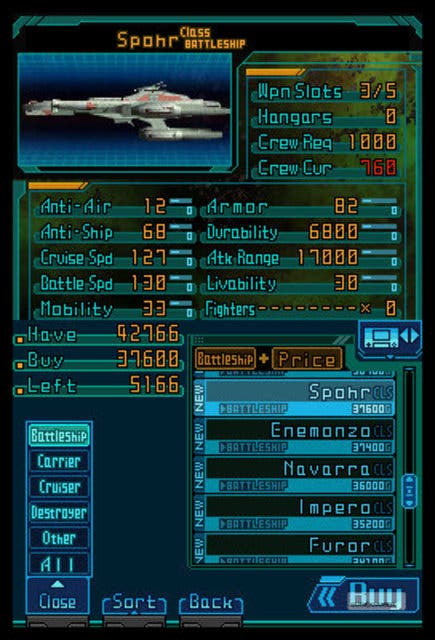Infinite Space
Room for improvement.
Combat begins with opposing fleets at either end of a small section of space, represented at the top of the lower screen by a simple diagram. Movement commands can be issued free of cost at any time, accelerating or reversing your fleet, or leaving it unpowered. This manoeuvring allows captains to bring their weapons to bear, their various range brackets usually allowing a natural sweet spot where all guns can fire.
Attacks are made via a command selection, with dodge, normal and barrage options initially available. Dodge will allow Yuri to evade the more powerful barrage attacks, but will turn normal attacks into criticals if used at the wrong time. In order to ensure this doesn't happen, captains will need to keep and eye on the colour of their enemies' craft on the battle screen as it changes according to their current level of gauge charge. A flicker from yellow to green usually means that dodge has been employed, whilst an extended period of yellow might mean that the opposing fleet is gearing up for a barrage, a powerful one of which could easily take out a ship in a single strike.
For what's essentially a rock/paper/scissors mechanic there's a great deal of subtlety to the system. Enemy captains will often fake out barrages, wrong-footing you with critical normal attacks and leaving you open for a follow-up barrage if they have the upper hand in gauge speed. Likewise, it's possible to negate a foe's dodge with a quick attack and devastate them with a follow-up barrage of your own. By the time the extra commands of launch fighters, anti-air (to deal with fighter squadrons), and melee boarding (handled in a separate mechanic) come into play, alongside two more customisable commands, a fully-formed and satisfying system has taken shape.
Clever use of the customisation system can make encounters too easy, though. Once you've got the measure of a sector's fleets it's not hard to best them every time. Spamming the normal attack once you've worked up a decent gauge speed is also an easy exploit; quickly taking out the weaker ships in the frontline of an enemy formation usually means that the barrage they inevitably charge will come from only one or two ships, making it thoroughly survivable.
In fact, despite the depth and flexibility of everything which goes into battle preparations, the fights themselves can quickly become formulaic. Occasional mission specifics such as individual targets or special enemy weapons switch things up a little, but for a game which requires a hefty amount of grind to fund all of the refitting you'll be doing, there are precious few highlights in the random encounter battles. They're also fairly sparse, meaning that when baby needs new space shoes, you'll spend a lot of time flying along the pre-set navigational star lanes, looking for trouble.

Another reason you might find yourself doing that is because you've totally forgotten what it is you're supposed to be doing. Incredibly, for a game with so much depth and so many deft touches, Infinite Space lacks the basic provision of a mission log, causing endless frustration when you've left it alone for more than a day.
Some mission threads are easily relocated - flying to hub planets to chat to someone at a bar or base will often refresh your memory - but other objectives are more obscure. Trying to remember that I was after a prisoner from a specific ship, only obtainable by using the otherwise pretty useless melee attack, meant gradually piecing the storyline back together in my head after a good hour of flying pointlessly from place to place. It's certainly not an insurmountable issue - a pen, paper and sense of due diligence should see you through - but why such a basic feature wasn't part of the design is a real curiosity.
At times this old-fashioned approach has its charms, but more often it's an obstacle between you and fun. A few extra usability touches, such as being able to preview the interiors of ships before they're bought, might have won Infinite Space a dearer place in my heart, and it's a shame to see a game I'd anticipated with such excitement hobbled by these unfathomable exclusions.
At 60-80 hours in length, and given the fittingly near-infinite customisability of your fleet, Infinite Space offers a massive chunk of fun for those who can forgive its foibles, but many will find the barriers to real enjoyment too high due to poor usability. A solid game for many rainy afternoons, then, but be prepared to work for your reward.
